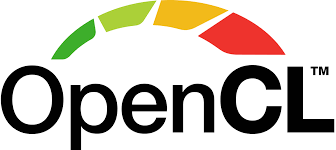OpenCL, meet the Gnuastro Build System
In this post, I hope to summarize the work done so far towards my GSoC project for integrating OpenCL with the Gnuastro library and my relatively limited understanding of OpenCL.
What is OpenCL?

Open Computing Language is a framework for writing programs that execute across heterogenous platforms. In simpler terms, OpenCL provides a standard interface for programmers to execute the same code across multiple devices, be it a CPU or a GPU or any other accelerator.
It comprises of the OpenCL standard which is maintained by Khronos, and implemented by the various hardware manufacturers and by the open source community across a wide variety of devices.
Most modern devices all support OpenCL in some format or the other. Intel/Nvidia for example provide their own propietary implementations. On the other hand, POCL an open source project provides implementations for those that dont have actively maintained propietary ones, like AMD.
Why OpenCL?

Unlike certain propietary frameworks cough CUDA cough, OpenCL is not constrained to any particular manufacturer. You can target any GPU/CPU as long as you get the OpenCL implementation for that device. This is made easy thanks to projects like POCL.
The performance of CUDA versus OpenCL is heavily debated and leans towards CUDA for Nvidia hardware, but the difference depends on the use case and isn’t too much of a concern as compared to the way they are used.
The downside of OpenCL is the smaller community and the lack of many modern features that CUDA brings.
The inner workings of OpenCL, how I managed to set it up, how the OpenCL C API works is another long story and is deserving of its own post.
Kickoff with Gnuastro
The first goal for the project was to figure out a way to integrate OpenCL with the Gnuastro build system.
Gnuastro like many other free software uses the GNU Build System also called GNU Autotools

The three major components of Autotools are:
Autoconf
At the heart of Autotools, we have Autoconf, which generates a single configure script from a configure.ac file.
This configure script scans the environment for various files and libraries, specific versions of them, the hardware being used, and more. Then, it configures the build of the project in certain ways enabling/disabling certain parts depending on what was found and what wasnt.
In this way, the portability of any project can be ensured by simply distributing the configure script, along with the Makefile.ins.
Automake
Automake makes use of information found by configure and generates the Makefiles necessary to build the project.
To be more precise, it parses Makefile.ams into Makefile.ins which are in turn parsed by configure to produce the final Makefiles. Automake also performs automatic dependency tracking, so that recompilling isn’t done unless required.
All you have to do, is specify the name and each of the sources involved in the library/binary, and Automake does the rest.
Libtool
Libtool is responsible for abstracting the library creation process, since different platforms handle static/dynamic libraries differently.
I mainly worked with Automake and Autoconf during integration and didn't really touch Libtool.
Stepping into Integration
Inside configure.ac
Without getting into detail, when checking for the presence of OpenCL, it suffices to check for libOpenCL.so and the CL.h header file.
That is, Gnuastro should be able to include the OpenCL header file to use its C API, and then later link against the OpenCL library.
Luckily for us, Gnulib provides a simple AC_LIB_HAVE_LINKFLAGS macro which takes as input, a library name and a test code and tries to find the library and compile/link the test code.
Upon successfully executing, it sets certain variables, so we can modify further building on the basis of finding OpenCL.
AC_LIB_HAVE_LINKFLAGS([OpenCL], [], [#include <CL/cl.h>])
AS_IF([test "x$LIBOPENCL" = x],
[
if successfull ...
],
[
LIBS="$LIBOPENCL $LIBS"
has_ocl=1;
if unsuccessfull ...
])
AM_CONDITIONAL([COND_HASOPENCL], [test "x$has_ocl" = "x1"])
After making these modifications to configure.ac, we can now test whether OpenCL was found inside the various Makefile.ams and accordingly change the build.
Inside Makefile.am
Now, we can use the variable we set previously in configure.ac and either include or exclude the OpenCL modules from being compiled and included in the library.
if COND_HASOPENCL
$(info "Found OpenCL")
MAYBE_CL = cl_utils.c
MAYBE_CL_H = $(headersdir)/cl_utils.h
MAYBE_CONVOLVE_CL = cl_convolve.c
else
$(info "What is Opencl?")
endif
libgnuastro_la_SOURCES = \
$(MAYBE_NUMPY_C) \
$(MAYBE_WCSDISTORTION) \
$(MAYBE_CL) \
$(MAYBE_CONVOLVE_CL) \
arithmetic.c \
arithmetic-and.c \
...
Additionally, we need to save this variable in Gnuastro’s config.h file for later use to prevent other modules from mistakenly including the OpenCL ones incase OpenCL was not compiled.
checking for build system… yes
Now when someone builds Gnuastro, if OpenCL is present on their system, then the OpenCL relevant files are compiled and included in the library.
On the other hand, if OpenCL is absent, then the library is built as normal, as if OpenCL never existed.
Finally, we can get started with the actual OpenCl part and we’ll have a look at Image Convolution(astconvolve) in the next post…